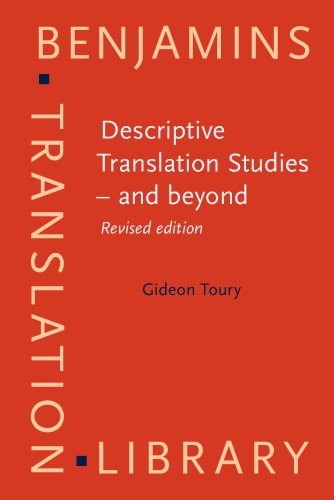Descriptive Translation Studies - and Beyond pdf
Par bingman sheila le vendredi, juin 24 2016, 04:56 - Lien permanent
Descriptive Translation Studies - and Beyond by Gideon Toury


Descriptive Translation Studies - and Beyond Gideon Toury ebook
Format: pdf
ISBN: 9027216061, 9789027216069
Publisher: John Benjamins Publishing Company
Page: 322
Translation and subjectivity: On “Japan” and cultural nationalism. How do we establish any relation between the semantic meaning of the source and the target text, or better said, Routledge Encyclopedia of Translation Studies, edited by Mona Baker, 1995. If some scholars believe it to be an obstacle to progress in translation studies, irrelevant or even damaging (Kenny 1995:77), should we completely dismiss it and pretend it didn't exist? Carl, Michael and Martin Kay “Gazing and Typing Activities during Translation: A Comparative Study of Translation Units of Professional and Student Translators.” Meta: Journal des . The community of practice model can help PSIT stakeholders share resources and knowledge beyond the traditional boundaries set by courses, schools or countries. In his book Descriptive Translation Studies and Beyond,. Descriptive Translation Studies and Beyond, by Gideon Toury, 2001. Amsterdam and Philadelphia: John Benjamins. Minneapolis: University of Minnesota Press. Christiane Nord: Translating as a Purposeful Activity: Functionalist Approaches Explained Gideon Toury: Descriptive Translation Studies and Beyond. Descriptive Translation Studies and beyond. Descriptive translation studies and beyond. Descriptive Translation Studies - and beyond: Revised edition. Beyond these basic requirements there is little agreement on what constitutes legitimate translating and how the science of linguistics, or even the knowledge of language structures, can and should be applied. Descriptive Translation Studies and Beyond. Simultaneous Interpretation as a Factor in Effecting Shifts in the Position of Texts in the Oral-Literate Continuum. Explain why our perspectives often concern the defense of minority cultures, the use of general models of cultural alterity, and a certain intuitive focus on distribution rather than production (cf. It employs the research paradigm of descriptive translation studies and the analytic tool of shifts. The translation studies reader. The target-side epistemologies of Descriptive Translation Studies).